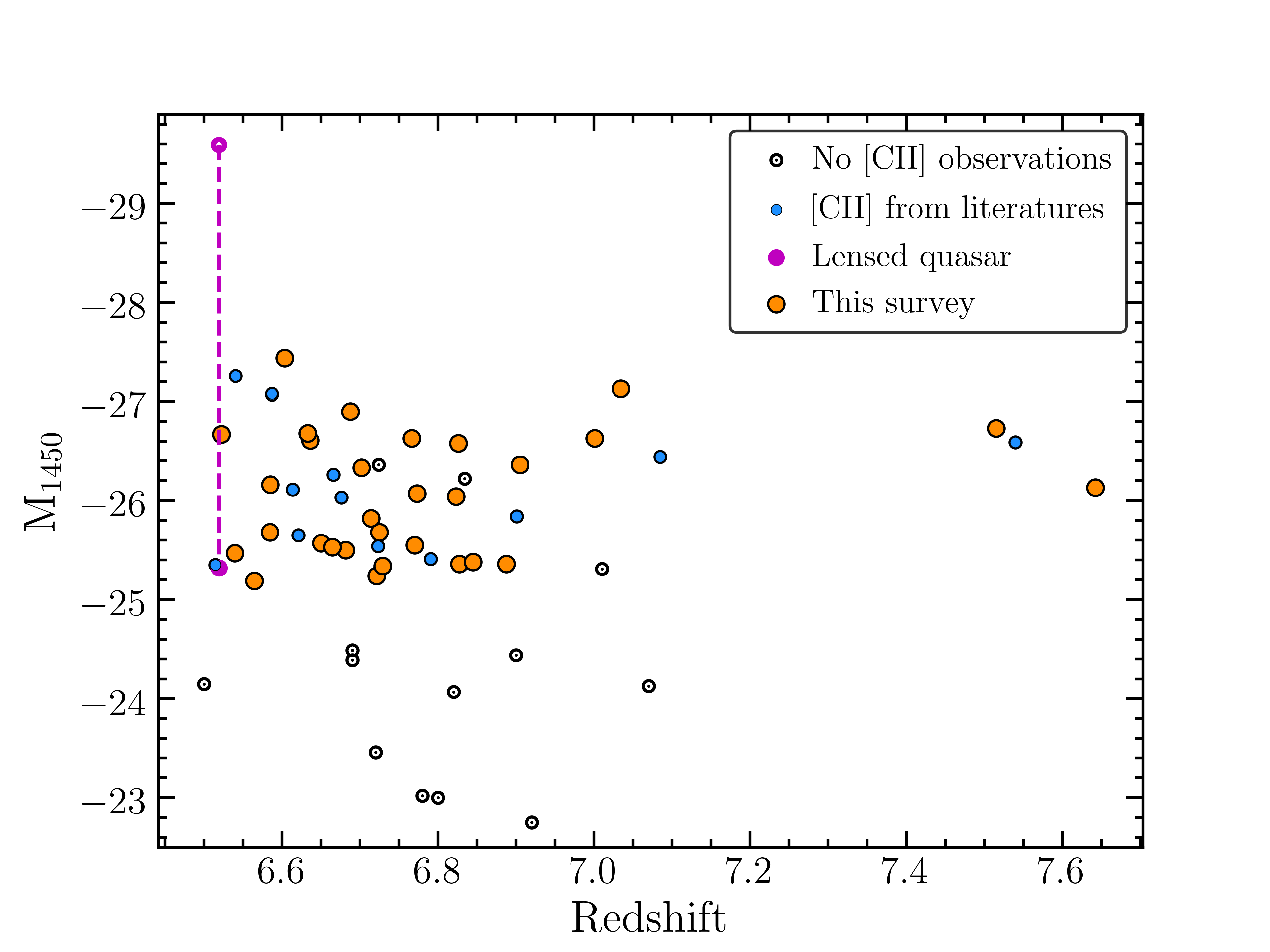Science Goals
We are performing a comprehensive [CII] survey of ~30 massive galaxies hosting luminous quasars at z∼7 with ALMA (led by Feige Wang) and NOEMA (led by Jinyi Yang). The main science goals of this survey are:- Characterizing star formation activities in the host galaxies of these earliest SMBHs.
- Measuring the dynamical masses of quasar host galaxies.
- Performing a census of [CII] emitters in the quasar environment.
- Probing the cosmic reionization history and quasar life time by combing the [CII] redshift measurements with infrared spectroscopy.
Sample
 The parent sample of our [C II] survey was designed to include all the known z > 6.5 quasars with M1450 < −25.0.
The figure in the right shows the redshift and M1450 distributions of all quasars known at z > 6.5.
In the literatures, there are 13 quasars have either ALMA or NOEMA observations at the time of designing this program (blue dots).
There are another two quasars J0244−5008 and J0020−3653 (black points) were proposed to ALMA in Cycle 5 by the quasar discovery team.
The remaining 31 quasars at z > 6.5 quasars with M1450 < −25.0 (highligted by orange and purple dots) were targeted by our survey.
The parent sample of our [C II] survey was designed to include all the known z > 6.5 quasars with M1450 < −25.0.
The figure in the right shows the redshift and M1450 distributions of all quasars known at z > 6.5.
In the literatures, there are 13 quasars have either ALMA or NOEMA observations at the time of designing this program (blue dots).
There are another two quasars J0244−5008 and J0020−3653 (black points) were proposed to ALMA in Cycle 5 by the quasar discovery team.
The remaining 31 quasars at z > 6.5 quasars with M1450 < −25.0 (highligted by orange and purple dots) were targeted by our survey.
Observations
 Our ALMA observations span two cycles with one program was performed in Cycle 6 (program ID:
2018.1.01188.S, PI: F. Wang) and the other two programs were obtained in Cycle 7 (program IDs:
2019.1.01025.S and 2019.A.00017.S, PI: Wang). Observations were carried out between 2018 December and 2020
March with 42-50 12m antennas and C43-3 or C43-4 configurations. The total awarded time is ~15 hours.
The left figure shows an example of the [C II] emission detected in the host galaxy of the
most distant known quasar, J0313-1806 at z=7.64.
Our ALMA observations span two cycles with one program was performed in Cycle 6 (program ID:
2018.1.01188.S, PI: F. Wang) and the other two programs were obtained in Cycle 7 (program IDs:
2019.1.01025.S and 2019.A.00017.S, PI: Wang). Observations were carried out between 2018 December and 2020
March with 42-50 12m antennas and C43-3 or C43-4 configurations. The total awarded time is ~15 hours.
The left figure shows an example of the [C II] emission detected in the host galaxy of the
most distant known quasar, J0313-1806 at z=7.64.
In Cycle 8, we will observe the brightest quasar host galaxies with C43-6 or C43-7 (program ID:
2021.1.00934.S, PI: J. Yang). These observations will reach similar spatial resolution with that of our
JWST Cycle 1 NIRCam imaging and allow us to fully resolve these massive galaxies
and enable the dynamical modeling of these galaxies.
Our NOEMA observations were obtained in the W18 cycle (program ID: W18EJ, PIs: B. Venemans and J. Yang).
We were allocated 24 hours observing time for this program.
All quasars were observed using 10-antennas with the C array configuration during the winter 2018.
Publications
Coming soon ...
